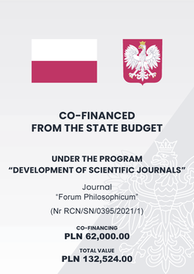- Home »
- Issues »
- 14/1 - Spring 2009 »
- Articles »
The Dignity of the Person in the Context of Human Providence
Abstract
Thomas Aquinas understands providence as the reason of directing things to ends (ratio ordinis rerum in finem), and as the execution of that directing, i.e. governance (gubernatio). Thus, providence is one of the fundamental attributes of the person that reveals the person's perfection and dignity. Providence consists in a free and reasonable directing of oneself and the reality subject to oneself in order to actualize potentialities of oneself and of other beings in the context of the ultimate goal of existence. Human providence joins the providence of the Absolute with regard to the world. In spite of its deficiencies human providence reveals the essential dignity of the human person.
Keywords
Cite this article
Mazur, Piotr Stanisław. “The Dignity of the Person in the Context of Human Providence.” Forum Philosophicum 14, no. 1 (2009): 109–18. doi:10.35765/forphil.2009.1401.08.
Bibliography
Heidegger, Martin. Bycie i czas. Translated by Bogdan Baran, Warszawa: Państwowe Wydawnictwo Naukowe, 2004. Koneczny, Feliks. O ład w historii. Wrocław: Wydawnictwo Nortom, 1999. Kowalczyk, Stanisław. Wolność naturą i prawem człowieka. Sandomierz: Wydawnictwo Diecezjalne, 2000. Krąpiec, Mieczysław Albert. “Natura ludzkiej wolności.” Człowiek w kulturze 9, (1997): 21–31. Lampert, Evgeniĭ. The Apocalypse of History; Problems of Providence and Human Destiny. London: Faber and Faber, 1948. Langford, M. J. Providence. London: SCM Press, 1981. Lipski, Joannes. Extensio providentiae divinae et applicatio spriritualis secundum Sanctum Thomam Aquinatem. Romae: Desclee &.Socii, 1957. Mazur, Piotr Stanisław. “Ku realizmowi w opatrzności ludzkiej.” In Błąd antropologiczny, edited by Andrzej Maryniarczyk and Katarzyna Stępień, 255–276. Lublin: Polskie Towarzystwo Tomasza z Akwinu, 2003. Mazur, Piotr Stanisław. “Opatrzność ludzka a wychowanie.” In Filozofia i edukacja, edited by Piotr Jaroszyński et al., 97–106. Lublin: Fundacja „Lubelska Szkoła Filozofi i Chrześcijańskiej”, 2005. Mazur, Piotr Stanisław. “Religia zwieńczeniem ludzkiej opatrzności.” In Studia z filozofii Boga, religii i człowieka, edited by Jan Sochoń, 3: 83–94. Warszawa: Uniwersytet Kardynała Stanisława Wyszyńskiego, 2005. Mazur, Piotr Stanisław. “Opatrzność.” Powszechna Encyklopedia Filozofii, edited by Andrzej Maryniarczyk, 7: 826–833. Lublin: Polskie Towarzystwo Tomasza z Akwinu, 2006. Mazur, Piotr Stanisław. “Prowidencja ludzka w państwie i prawie.” Studia Diecezji Radomskiej 8 (2007): 305–320. Mazur Piotr Stanisław. “Działanie celowe—między prakseologią a prowidencją ludzką.” Edukacja Filozoficzna 46 (2008): 151–162. Mondin, Battista. “Wolność jako istotny i pierwotny czynnik konstytutywny osoby ludzkiej.” Człowiek w kulturze 9 (1997): 79–98.





